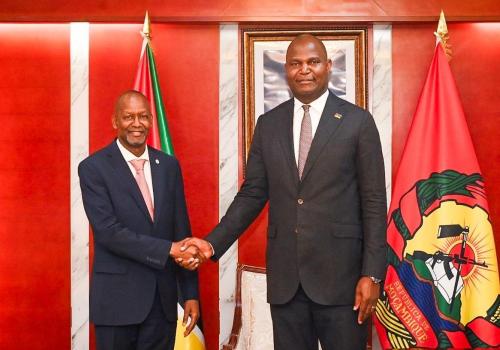The Executive Secretary of the Southern African Development Community (SADC), His Excellency Mr. Elias Mpedi Magosi, paid a courtesy visit to His Excellency Mr. Daniel Francisco Chapo, President of the Republic of Mozambique, on 9 September 2025, in Maputo, Mozambique.
President Chapo, who assumed office on 15 January 2025 as the fifth Head of State of the Republic of Mozambique, welcomed the SADC delegation and reaffirmed the nation’s commitment to inclusive growth, regional resilience, and multilateral cooperation.
“Mozambique remains committed to building a peaceful, prosperous, and interconnected Southern Africa,” President Chapo said. “We believe that regional solidarity is the foundation upon which sustainable development must be built.”
The meeting provided an opportunity to discuss strategic priorities including energy development, infrastructure expansion, trade facilitation, industrialisation, and regional peace and security. The Executive Secretary briefed H.E Chapo on SADC’s current operations and shared his vision for accelerating regional integration.
“Our goal is to unlock the full potential of regional cooperation by removing barriers and investing in transformative projects,” said the Executive Secretary H.E Magosi.
President Chapo expressed deep appreciation for SADC’s support in stabilising Mozambique, particularly through the deployment of the SADC Mission in Mozambique (SAMIM) operated from July 2021 to July 2024.
“SAMIM played a critical role in stabilising conflict-affected areas and restoring public confidence,” he noted. “The solidarity demonstrated by SADC Member States has strengthened our resolve to uphold peace and build lasting resilience.”
In a forward-looking gesture, President Chapo announced the launch of national public dialogues aimed at addressing post-election conflicts and fostering reconciliation. “Peace is not just the absence of conflict, it is the foundation upon which development is built,” he emphasised. “These dialogues will ensure inclusive engagement and national unity.”
The SADC Executive Secretary outlined key regional priorities, including operationalising the SADC Regional Development Fund, ratifying legal instruments to boost trade and investment, and establishing one-stop border posts to streamline cross-border movement. He called for the elimination of persistent trade barriers such as non-tariff measures, poor transport connectivity, and inconsistent regulatory frameworks. “We must simplify customs procedures and reduce transit times to facilitate the free flow of goods and services,” H.E Magosi said.
Energy security featured prominently, with renewed calls to expand power generation and promote cross-border electricity trade. President Chapo highlighted Mozambique’s efforts to establish one-stop border posts with the United Republic of Tanzania, South Africa, and Malawi, supported by the African Development Bank and Africa50. He also outlined progress on electricity interconnectors with Malawi, Zambia, Tanzania, and Zimbabwe, including the Mozambique–Tanzania (MOTA) and Mozambique–Zimbabwe (MOZI) transmission lines.
Through its national gas company, ENH, Mozambique is implementing the SADC Regional Gas Master Plan (2023–2038), which includes LNG terminals, a 2,600-kilometre pipeline, and gas-to-power plants.
In the water sector, Mozambique is participating in the €10.6 million Lomahasha/Namaacha Cross-Border Water Supply Project, jointly supported by the SADC Water Fund, KfW, and the governments of Mozambique and Eswatini, which will provide clean drinking water to over 40,000 residents by early 2026. Infrastructure includes a bulk pipeline, pumping stations, and reservoirs drawing from the Mbuluzi River.
Mozambique continues to lead in regional mobility and planning through initiatives such as the North–South Economic Development Corridor, the SADC Railway Masterplan, and the Tripartite Transport and Transit Facilitation Programme. The country has endorsed a $16.1 billion plan with six other SADC nations to transform the North–South Corridor into a smart, digitally integrated trade route. This corridor is expected to generate 1.6 million jobs and add over $16 billion to regional GDP.
Mozambique has also adopted the SADC Coordinated Border Management Guidelines, signed a Simplified Trade Regime agreement with Malawi, and advanced its Electronic Certificate of Origin system, measures that are streamlining customs and accelerating digital integration.
On regional disaster management, as host of the SADC Humanitarian and Emergency Operations Centre (SHOC) in Nacala Porto, Mozambique continues to demonstrate regional leadership in disaster management. Since its launch in 2021, SHOC has become a key hub for emergency response across Southern Africa. President Chapo’s role as African Union Champion for Disaster Risk Management further reinforces this commitment. Future priorities include expanding SHOC’s infrastructure, establishing coordination hubs, mobilising resources, and deepening collaboration with the African Union’s Multi-Hazard Early Warning and Action System (AMHEWAS) Programme.
The SADC Executive Secretary was accompanied by Dr. Mike Masiye, Director of Policy Planning and Resource Mobilisation; Mr. Anderson Kamdambo Banda, Director of the SADC Humanitarian and Emergency Operations Centre; Ms. Barbara Lopi, Head of Communications and Public Relations; and Ms. Kealeboga Moruti, Senior Officer for Public Security at the SADC Secretariat.

